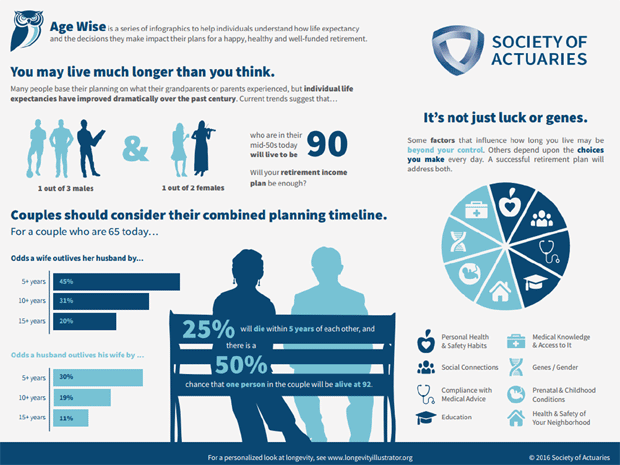Retirement planning step 1: How long will you live?
Most people just want to live a long time and be happy, but you might not be very happy if you're broke. That's what can happen to people who don't plan for the possibility that they -- or their spouse or partner -- could grow old and be poor for many years -- the so-called "longevity risk."
In the spirit of "A picture is worth a thousand words," here's an insightful infographic recently released by the Society of Actuaries (SOA) that summarizes a few important points about longevity risk. It uses the helpful Longevity Illustrator that was jointly developed by the SOA and the American Academy of Actuaries.
Copyright © 2016 Society of Actuaries, Schaumburg, Illinois. Reproduced with permission.
Here are some very basic messages you can take away from this infographic:
- You might live much longer than you think.
- You don't know how long you'll live, meaning your actual lifespan can be highly variable.
- A number of factors will influence your longevity, including lifestyle decisions that might increase the odds that you'll live a long time (although there's no guarantee).
- If you're married or in a committed relationship, one of you could outlive the other by many years. If you really care about your spouse or partner, you'll make sure they'll be financially secure after you're gone.
How can you incorporate these concepts into your retirement planning? Make sure you develop sources of retirement income that last the rest of your life -- and the life of your spouse or partner -- no matter how long either of you lives. It might take a lot of effort to complete the necessary planning, but that's only to be expected if you want financial security for a few decades of your life.
If you can't do this on your own, you'll want to find a skilled and unbiased planner who can help you.
Start by optimizing your Social Security benefits, which often means the primary wage earner delays collecting benefits for as long as possible (but no later than age 70). You'll want to deploy your retirement savings to generate retirement income that lasts for life, which can mean using a prudent systematic withdrawal method with invested assets, buying an annuity from an insurance company or some combination of the two.
If you do a good job of calculating whether you have enough money to retire and live a long time, you might conclude that you'll need to work longer to allow your retirement resources to grow. But that shouldn't be a bad thing, particularly if you find work that you enjoy with possibly shorter hours, more flexibility and social engagement. You'll also want to take care of your health and nurture your social network.
Whew! Nobody promised that living a long time would be easy, but taking the time now to plan for a long life will pay off for you and your loved ones.

